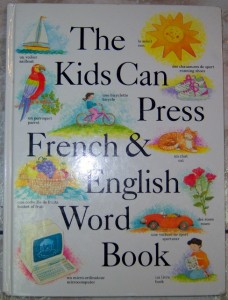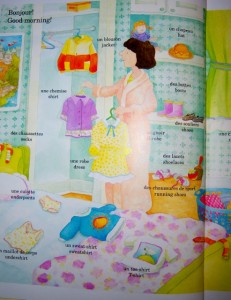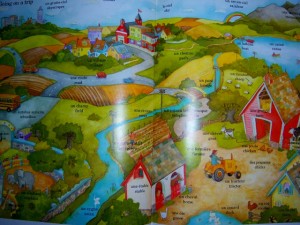My goal for elementary school French is to have the children spend about 10 minutes a day, every school day, exposed to spoken French. I want them to become familiar with vocabulary, the sound of the language, and some of its sentence structures. Most of all, I want them to enjoy it and feel a sense of accomplishment in it. These different aspects form a solid basis for our formal French studies that begin in grade 7.
Therefore we use many resources for elementary French, and one of them is the French and English Word Book.
This sunny book teaches children more than 500 common French words using beautiful illustrations. Most words are taught in the context of a detailed scene about topics such as “In my backyard,” “Barbecue time,” “A day at the zoo”, and “Good morning!” Other pages contain words about opposites, colors, family members, and breakfast time.
After 45 colorful pages, the book presents an unusual word list. Only the English words are given in this list, along with the page number they occur on. It would have been helpful to have a French list as well, but since we rarely use word lists, this does not really affect us.
How We Use It
For our French time, the Little Misses (ages 9 and 11) and I snuggle on the couch and go through a few pages of The French and English Word Book (as well as The French and English Phrase Book). I read the word aloud, they repeat after me, and then we proceed to the next word. Since the English is written just below the French, and since we’ve gone through this book before, I do not need to translate anything for them.
Every once in a while the girls ask for a test. Then they sit opposite me and I read the English to them; they respond with the corresponding French words. Since my language goals for this age involve familiarity with and exposure to French, these are very low-key tests and the girls enjoy them. Once they know a page well, we only review it occasionally.
What We Think of It
Every time I sit down with the Little Misses to read this book, I look forward to Linda Hendry’s cheerful illustrations. With sunny colors, happy vignettes, and an obvious love of living, she fills The French and English Word Book with joy. My girls love this book and look forward to French time. My older children enjoyed it too, when we used to study it at the dining table right after lunch.
With 500 common words, this is a great introduction to French vocabulary and helps to lay a useful foundation for the formal study of French. I also find it a good review for me to go over these words regularly and to share any interesting words with my teens. There’s fun for all of us in rediscovering, for example, that a lion’s fang is called a ‘croc,’ which probably has something to do with the word ‘crocodile’…. And what is fun is more easily remembered.
Although the Phrase Book is wonderful too, the Word Book has the advantage of teaching only one word at a time. This really helps with vocabulary mastery, and in turn makes the Phrase Book more effective. Ideally you would use them both.
Our family loves this book. We highly recommend it to other parents teaching their children French.
Note: To use this book you need to know how to pronounce the French words.
The Kids Can Press French and English Word Book is available from Amazon, but may also be in your library.
Disclosure: I have used this book for many years and am not compensated in any way for this review.
— This review is linked to Read Aloud Thursday.





Grace and I want to learn French. I took a semester in college, so I have really no clue! We bought a program for the computer. One that is supposed to be better than R. Stone. I am not so sure about that claim, but it was less expensive! I want to learn French so that we can take a trip to Canada before she graduates in 6 years. I figure that is a doable goal. Our library has some good elementary French books, too. The one with Babar is excellent. I need to buy that one! Have you seen it?
Yes, that Babar book is fun! I should get it from the library after we finish the Phrase Book and the Word Book. Thanks for reminding me.
What an excellent review! You certainly have convinced me that this book would be worthy if our time and money! Now if I could ONLY learn to pronounce French words! 😉
We have resources in our library that teach pronunciation of basic vocabulary. Maybe you do as well? There are online resources as well, some free.
Nice to meet you! My three girls and I are interested in learning French. I took six years of Spanish in HS and college, so you can imagine that I haven’t the faintest clue how to pronounce any French word! Our sponsor child speaks French, we’re studying Monet and reading other books where French words pop up, so I thought, we’d better learn it! I plan to sign up for French language lessons at our library and I’ll certainly add this book to our curriculum! Thank you for the fabulous resource!
You’re welcome!
Apparently if you know Spanish or Portuguese you can get by in French. My sister knew Portuguese and was able to work as a nurse in a French/English bilingual hospital.
I studied French in college (it was one of my double majors, which meant all of my classes, starting freshman yea, were in French). Then a friend and I did the “backpacking around Europe” thing between junior and senior years. Since French, Italian, and Spanish are all Romance languages (derived from ancient Roman), you can “get by” in another while knowing one. (I was able to “get by” during our time in Italy with things like announcements that the subway car we were riding was having mechanical difficulties and that’s why we were stopping suddenly while underground.) But it’s hard to carry on extended conversations, and there are some differences in pronunciation rules, etc. Evidently, I was terrible at helping my younger sister with the high school Spanish she was studying at the time: I kept not pronouncing the letters at the end of words, because in French, you don’t always say everything that’s spelled. Apparently, in Spanish, you do. 🙂
Good point! Thanks.
So it would be a good idea to get a pronunciation guide from the library for a Spanish speaker to learn French properly on your own; but if you wanted to get by in the country, you could function.
I forgot that I have this great link to share about learning French. Not sure how much I will use, but it is interesting.
http://annkroeker.com/2012/03/10/do-it-yourself-french-13-language-acquisition-ideas-for-the-easily-bored-non-sequential-or-add-learner/#comment-112294
By the way, Grace is playing the game that came with our program right now and is having fun. The player is in Paris and people are speaking in French to you. 🙂
That’s a wonderful link. I’m hoping to use some of the ideas there to keep our French up in the summer. Keeping up with the older kids’ textbooks during the summer seems just a bit too ‘schooly’.
i love this book! Neither of my parents spoke French and as I child I struggled to find the words I needed to complete my French homework! This book really helped me and 20 years later I still have it on my bookshelf and actually just used it in my classroom for the first time last month!
[…] Review: The Kids Can Press French and English Word Book | Tea … – This book is a great introduction to French vocabulary and helps to lay a useful foundation for the formal study of French. […]